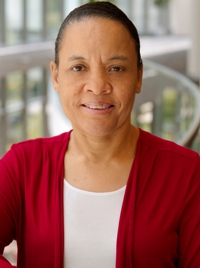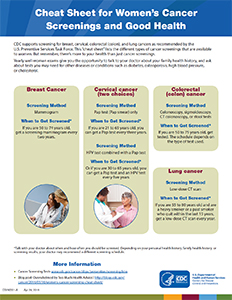Overwhelmed by Too Much Health Advice? Cheat Sheet for Women’s Cancer Screenings and Good Health
Posted on by
By Lisa C. Richardson, MD, MPH
Director of CDC’s Division of Cancer Prevention and Control
As a doctor, I am the go-to person my friends rely on when they have a medical question. A good friend recently said to me, “I’m so overwhelmed by all of the health advice out there that I tend to just tune it all out.” She went on to say that every time she turns around, she hears something else that women should do to stay healthy: get a mammogram, get your Pap smear, get a colonoscopy, don’t smoke, exercise, get more sleep, get a flu shot, eat more kale, get a whooping cough vaccine (pertussis booster vaccine)…and I think you get her point. I certainly did.
This got me thinking. As a woman, an oncologist, and the director of CDC’s Division of Cancer Prevention and Control, I can help. I don’t want you ignoring anything that may help you stay healthy…and alive! To help lighten the load, I’ve created your very own cheat sheet for cancer screenings and good health. CDC supports screening for breast, cervical, colorectal (colon), and lung cancers as recommended by the U.S. Preventive Services Task Force.
I’ve started your cheat sheet off with the screenings (checking your body for a disease before you have symptoms) that are available for some of the cancers that most often affect women. But I challenge you to add to it with your doctor’s recommendations for further screenings or tests based on your own health, family history, and age. Download this printable fact sheet [PDF-106B] to take to your next appointment.
Your Cheat Sheet to Cancer Screenings and Good Health
| Type of Cancer | Screening Method | When to Get Screened* |
|---|---|---|
| Breast cancer | Mammogram | If you are 50 to 74 years old, get a screening mammogram every two years. |
| Cervical cancer (two choices) | Pap test (Pap smear) only | If you are 21 to 65 years old, you can get a Pap test every three years. |
| HPV test (combined with Pap test) | Or if you are 30 to 65 years old, you can get a Pap test and an HPV test every five years. | |
| Colorectal (colon) cancer | Colonoscopy, sigmoidoscopy, or fecal occult blood testing (FOBT) | If you are 50 to 75 years old, get tested. The schedule depends on the type of test used. |
| Lung cancer | Low-dose CT scan | If you are 55 to 80 years old and are a heavy smoker or a past smoker who quit within the last 15 years, get a low-dose CT scan every year. |
*Talk with your doctor about when and how often you should be screened. Depending on your personal health history, family health history, or screening results, your doctor may recommend a different screening schedule.

And like any good doctor, I want to remind you of some simple things you can do every day to stay healthy:
- Maintain a healthy weight.
- Exercise regularly.
- Get plenty of rest.
- Don’t drink alcohol, or limit it to one drink a day.
- Don’t smoke.
As I get older and watch my family and friends age beside me, I see how important good health is. It sounds so easy, right? But as a working mom, wife, and daughter, I know how many different directions you are pulled in every day. But remember, the best gift you can give the people who care about you is a healthy you.
Put YOU at the top of your to-do list today so that you can give yourself the best chance of preventing or overcoming something that doesn’t have to overcome YOU.
Lastly, to all of you fighting cancer or caring for someone who is fighting this battle, I encourage you to take steps to stay as healthy as you can during treatment. For more information, visit CDC’s Preventing Infections in Cancer Patients website for staying healthy during cancer treatment and 3 Steps Toward Preventing Infections During Cancer Treatment from the CDC Foundation.
11 comments on “Overwhelmed by Too Much Health Advice? Cheat Sheet for Women’s Cancer Screenings and Good Health”
Comments listed below are posted by individuals not associated with CDC, unless otherwise stated. These comments do not represent the official views of CDC, and CDC does not guarantee that any information posted by individuals on this site is correct, and disclaims any liability for any loss or damage resulting from reliance on any such information. Read more about our comment policy ».
Thank you very much CDC for giving the world information about several diseases. Keep it up.
What is the recommendation for women over 65 years in regard to cervical cancer screening? Does this depend on her medical history (e.g., history of breast or other form of cancer)?
If a woman has had a total hysterectomy (no cervix present), is a Pap test still recommended? Would it be on the same schedule as for women who do have a cervix?
For women who have had breast cancer (unilateral), is the mammogram recommendation still every two years? Does the schedule change as time after diagnosis/treatment increases?
These are excellent questions. Please see our information about cervical cancer screening at What Should I Know About Cervical Cancer Screening? We also have a Cervical Cancer Screening Guidelines chart [PDF-175KB] that compares recommendations from expert organizations.
If you are older than 65 and have had normal Pap test results for several years, or if you have had your cervix removed as part of a total hysterectomy for non-cancerous conditions, like fibroids, your doctor may tell you that you do not need to have a Pap test anymore.
Any person who has had cancer is not at average risk, and should talk to her doctor about how often to get screened.
This is a super idea! I have included this graphic on my Web site at:
http://www.bettycjung.net/Womenhealth4.htm
Thanks!
That’s awesome! Thanks for helping to spread the word!
This Cheat Sheet for Women’s Cancer Screenings and Good Health is very helpful. Is there a similar flyer for men?
Thanks so much! We are working on a cheat sheet for men. Stay tuned!
In our set-up, Kenya, only the elite patients complain of ‘ too many screening tests’. Many rural women are yet to hear about any form of health screening, and when they are aware of they tests, they may not access the testing due to cost, distance and other factors
Thank you so much for all that the CDC does every day. It is really amazing all the information that I have received like in this article this is the best information you can have.
After being diagnosed with colorectal cancer last year I was lucky to have caught it early only stage 1. I am now cancer free due to early detection
Thank you for all your wonderful information
Wendee
Why do all suggestions stop at 80 years of age?? Many women and a number of men I know are approaching 90 or are into their 90’s. Should all screening stop at 80?
Does medical research stop at 80? And though many cancers are mentioned, is there no research to indicate causes of or screening for bladder cancer?
Thank you for any response to these queries.
Thank you for asking these questions.
“Why do all suggestions stop at 80 years of age?? Many women and a number of men I know are approaching 90 or are into their 90’s. Should all screening stop at 80?”
The United States Preventive Services Task Force (USPSTF) is an independent group of national experts in prevention and evidence-based medicine. The Task Force works to improve the health of all Americans by making evidence-based recommendations about clinical preventive services such as screenings, counseling services, or preventive medicines. To develop a recommendation statement, Task Force members consider the best available science and research on a topic. The recommendations are based on the quality and strength of the evidence about the potential benefits and harms. They also are based on the size of the potential benefits and harms.
In most instances, the recommendations for cancer screening in adults older than 75 to 80 years of age has been either an ‘I’ statement (The USPSTF concludes that the current evidence is insufficient to assess the balance of benefits and harms of the service. Evidence is lacking, of poor quality, or conflicting, and the balance of benefits and harms cannot be determined) or a ‘D’ statement (The USPSTF recommends against the service. There is moderate or high certainty that the service has no net benefit or that the harms outweigh the benefits).
“Does medical research stop at 80?”
No, medical research does not stop at 80. The National Institute on Aging is dedicated to understanding the nature of aging, supporting the health and well-being of older adults, and extending healthy, active years of life for more people. One of their publications includes The Health and Retirement Study.
“And though many cancers are mentioned, is there no research to indicate causes of or screening for bladder cancer?”
The USPSTF reviewed bladder cancer in adults in August 2011, and concluded that the current evidence is insufficient to assess the balance of benefits and harms of the service. Evidence is lacking, of poor quality, or conflicting, and the balance of benefits and harms cannot be determined (‘I’ statement).